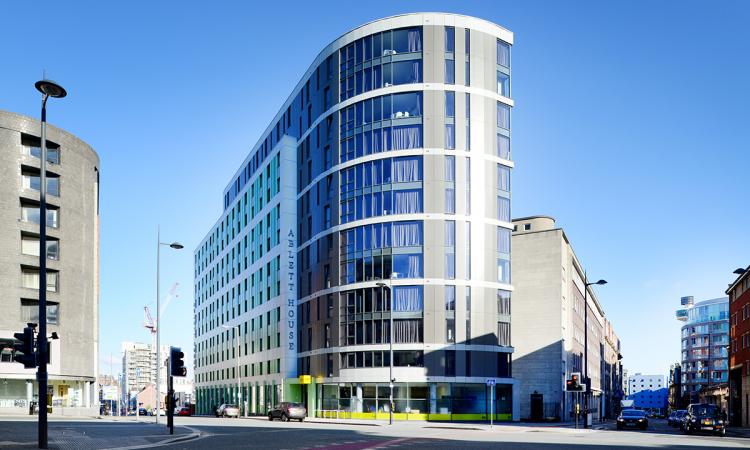The UK has a university sector that many other countries aspire to. Our universities are world leaders in research and innovation and our graduates are in worldwide demand! Universities are essential for the UK’s knowledge economy, attracting business and investment to all regions of the UK. The importance of attracting and retaining students to study in our universities can not be underestimated.
However, over recent years government funding available to universities has reduced and they have been forced to look for new ways to fund their operations. Funding now comes primarily from student fees, which have also increased in recent years. Universities are under pressure to expand their populations to achieve their funding requirements and are increasingly having to compete for the attention of prospective students. One way to do this is to offer modern and high-tech accommodation which is a far cry from the outdated and stereotypical image of students digs! In this blog, Procure Partnerships Director Robbie Blackhurst, discusses the increasing reliance on private investors, often from overseas, to provide Purpose Built Student Accommodation and the various issues this can unearth for both the students and the universities.
What is Purpose Built Student Accommodation?
Purpose Built Student Accommodation (PBSA) is housing built specifically for students to live in. It usually takes the form of cluster flats (bedrooms with shared kitchen and living areas), or private studios. The accommodation block will also include leisure facilities and social spaces such as cinemas, gyms, or games rooms.
PBSA is in high demand. Across the UK, around 30% of full-time first-year students live in private Purpose Built Student Accommodation, up from 22% five years ago. Currently in the UK, full-time student numbers outweigh the PBSA bed spaces by 3:1, and the high volume of student accommodation, either planned or underway, is not expected to address the current supply/demand imbalance which is evident in a number of key cities.
Global Real Estate Consultants, Knight Frank, report in their 2018 analysis of PBSA in the UK, that although 69% of PBSA student beds were currently owned and operated by universities, universities are becoming increasingly dependent on the private sector to provide accommodation for their students. In total, private sector developers would deliver 84% of the beds due to be built for the 2018/19 cycle.
With the many issues facing universities, including a potentially reduced intake from the EU due to Brexit uncertainty, reduced funding and increasing competitiveness between universities who need to compete for students, it seems that they are increasingly turning toward the private sector to address their student housing needs. In an environment where Higher Education Funding (HEFCE) is reducing (2014 funding was 70% lower than it was is 2006), many UK universities find themselves struggling to finance capital projects. In fact, in a third of institutions, Capital Spending fell by as much as 25% between 2008 and 2014.
Why is student accommodation an attractive prospect to private developers?
The reliance of universities on the private sector to help with plans for expansion presents significant potential and opportunity for investors. Providing student housing in the UK has become big business! Not only is there huge demand, but the investment is seen as being fairly secure, even during the current tumultuous economic and political climate in the UK.
Due to the UK’s renowned higher education institutions, the PBSA market has proven to return a steady and profitable investment. This potential has been recognised by numerous international investors, particularly from Singapore and Dubai, who have been purchasing huge PBSA portfolios in the UK’s major cities.
How does private investment benefit the universities and local communities?
Private PBSA frees up universities to focus on teaching and research. Ultimately, universities are looking to focus on their core competency of providing the best education to students. While student housing is part of that experience and has an impact on how students succeed, outsourcing these requirements helps to free up their resources and allows them to allocate their precious capital budgets elsewhere.
PSBA provides a good option for international students. Overseas students make up around 14% of acceptances through UCAS and some 86,000 international students enrolled in UK universities in 2017/18 as undergrads according to HESA. International students are the main market for PBSA as they require convenience as they enter an unknown city. International students and postgraduates prefer ‘plug and play’ accommodation, they don’t want the hassle of having to sort out their own council tax and bills!
PBSA allows inner city housing stock to return to families in need. In acknowledging the challenges impacting the wider housing market, huge benefits can be taken from the provision of tailor made, good quality accommodation for students. Importantly for PBSA investors, many local authorities now have Article 4 Directions in place to limit the amount of new HMO’s (house in multiple occupation), largely as a result of concerns over loss of family homes and the impact that transient student communities can create, including issues concerning parking, waste and noise in what were traditionally ‘family’ areas.
It can be said that PBSA also provide a better standard of living than shared housing might provide. Students benefit from on-site facilities, as well as increased security and the benefit of not having to deal directly with landlords/agents. The new popularity of PBSA is likely to lead to the traditional inner-city homes that have provided the bulk of student housing, potentially converting back to family homes.
What are the draw backs to private PBSA?
Private PBSA can be expensive and out of many student’s affordability. Perhaps the main concern of private investors has not exclusively been the overall wellbeing of the student residents. PBSA can be very expensive to rent and affordable options are limited. PBSA contains a high proportion of studio style accommodation, which is the most expensive options and not affordable to many students. Private student accommodation providers must focus on the provision of affordable stock and more shared units. This has been a recent concern of the National Union of Students, who believe that Planners should intervene and call time on over-investment in the studio market, imposing strict conditions on the permission for more studio apartments. At a time, when student mental health is a major concern, private providers should be considering how to make accommodation universally affordable to reduce the financial pressures on students and their families.
Private developers are criticised for not contributing to the local economy. Whist it can be said that an abundance of students will have a positive impact on local trade, private developers’ profits do nothing to benefit the local communities. Private developers are generally not required to provide any contribution towards local affordable housing or to do anything to help address local economic issues. It is a very real concern that private investors are cashing in on the privatisation of student housing, using offshore companies and paying very little tax. Whilst students are under increasing pressure to pay high rents, offshore companies are maximising their gain.
There is often ambiguity over the classification of student housing. PBSA is not officially classified as ‘housing’ and as such, it doesn’t have to adhere to the usual standards associated with dwellings (class C3). Local authorities take different approaches, but student accommodation is usually either treated as a hotel (C1) or residential institution (C2), the same category as care homes, hospitals and boarding schools. These types of building are exempt from many of the codes that govern residential dwellings, such as standards for space, daylight, acoustics, parking and private amity space.
PBSA buildings are not necessarily in keeping with local architecture. Many have criticised the style of the Purpose Built Student Accommodation blocks which have sprung up across most of our major cities. Developers have been criticised for specifying cheap materials and designing the buildings to fit in as many students as possible, with cramped bedrooms and tiny windows. Perhaps the aesthetic design has historically come secondary to the developer’s primary goal of optimising revenue?
It is not hard to see why private PBSA is a booming industry. Whilst the public / private relationship has the potential to benefits both parties, removing the pressure from universities to spend their budgets on the provision and maintenance of accommodation and also relieving the pressure from precious local authority housing stock, the privatisation of student accommodation runs the risk of pricing out many students. The spotlight is now shining on private providers to increase affordability and ensure that all students can access high-quality PBSA and the more affordable cluster flats. Experts believe that as the industry moves forward, there will be an increased emphasis on private developers to be more accountable to the markets they are serving.

Robbie Blackhurst is the Founder and Director of Black Capital Group, the holding company that powers Advance Social Value, Compliance Chain, Procure Partnerships Framework and Strategic Resourcing. Robbie is a member of the Chartered Institute of Builders, is MCIPS certified and has an undergraduate degree in Aviation and Aerospace, a postgraduate degree in Construction Project Management, and a Master’s in Business (MBA).



